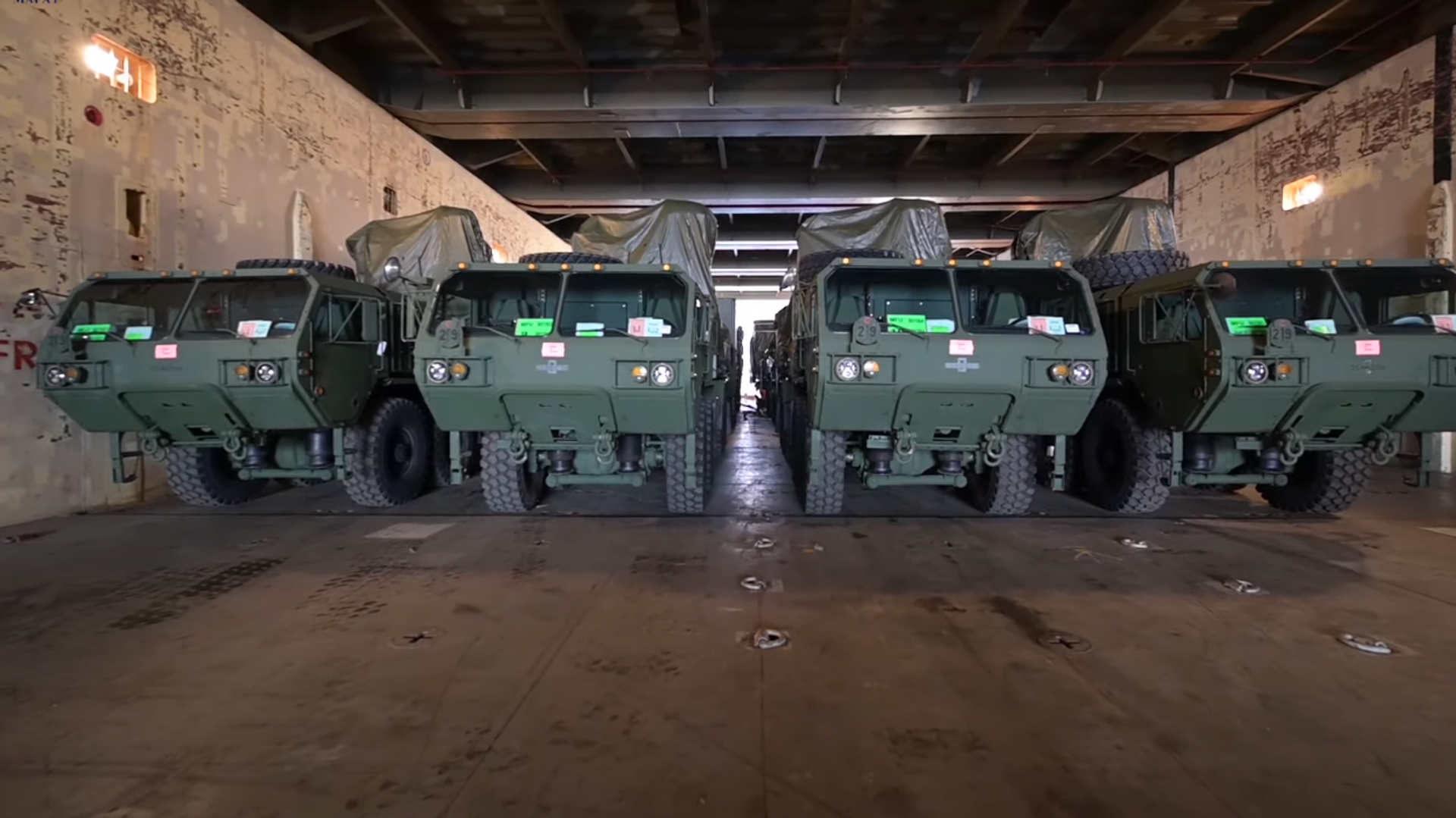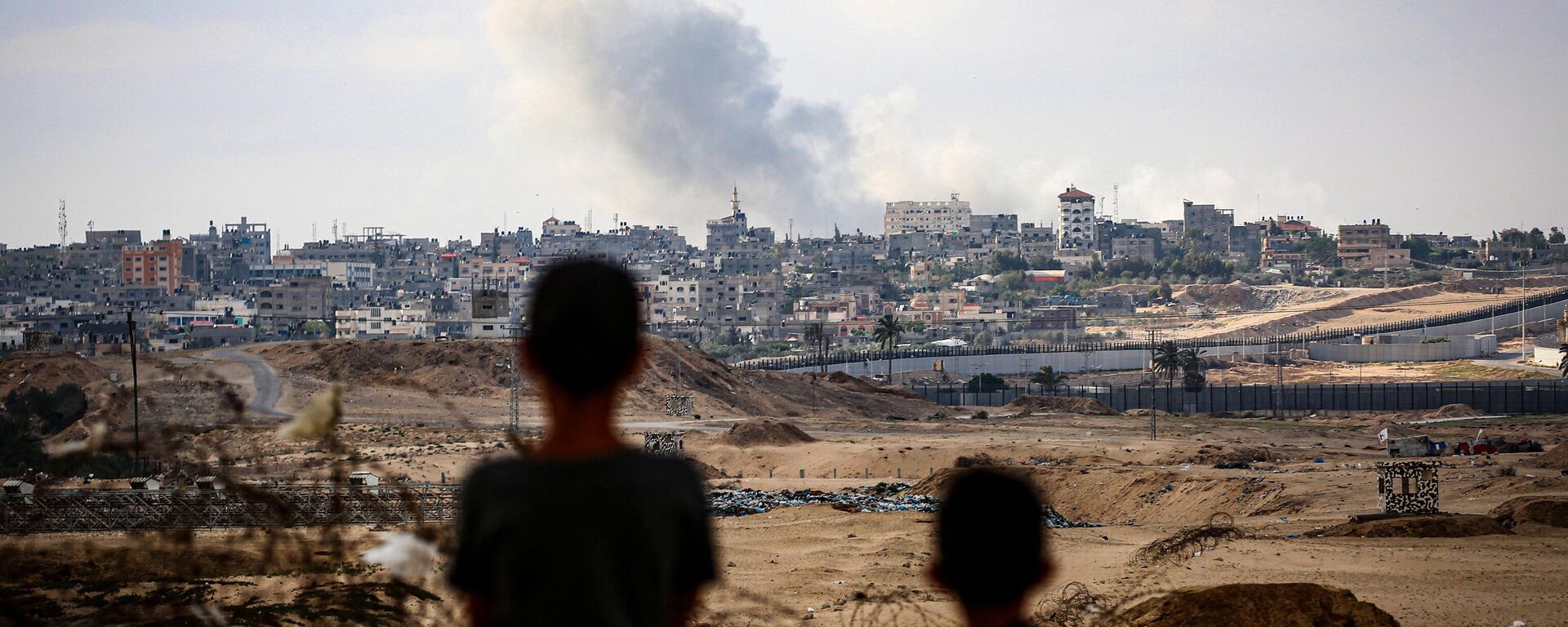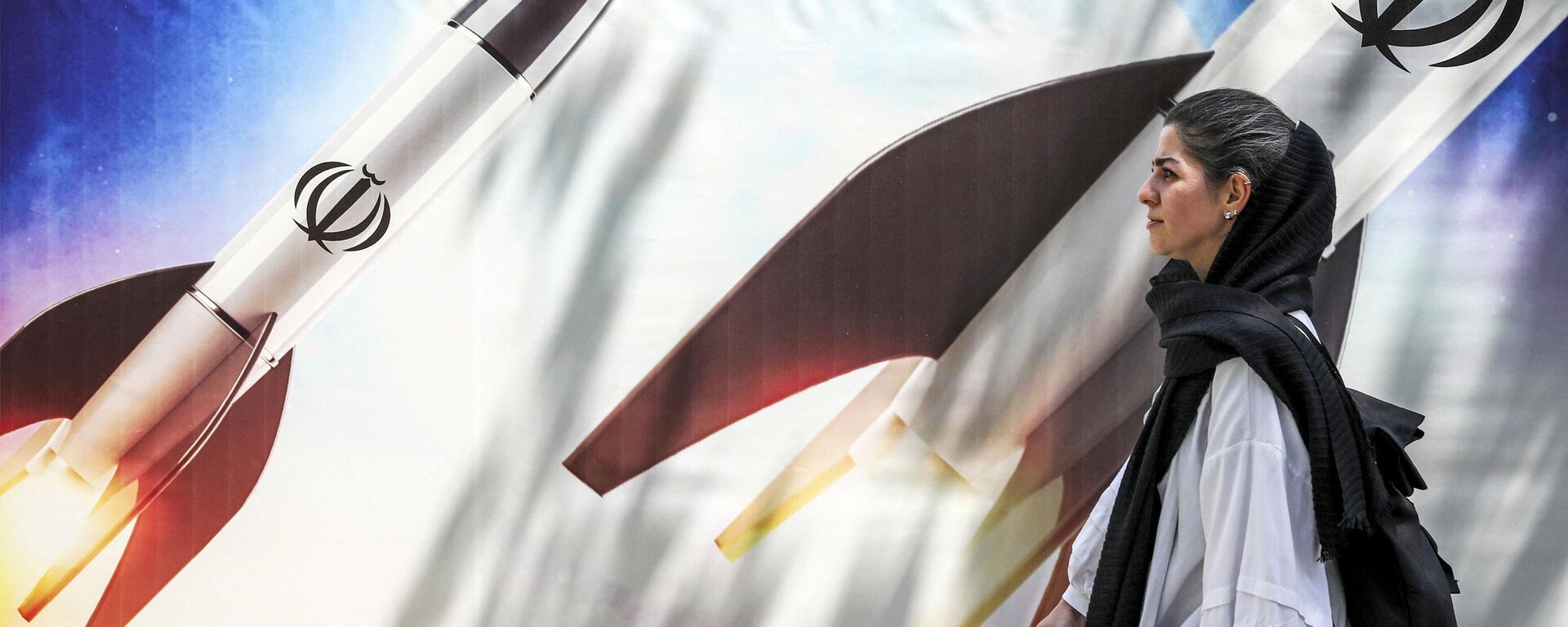https://sputnikglobe.com/20240530/why-israeli-military-industrial-complexs-dizzying-gaza-war-profits-wont-last-1118706135.html
Why Israeli Military-Industrial Complex’s Dizzying Gaza War Profits Won’t Last
Why Israeli Military-Industrial Complex’s Dizzying Gaza War Profits Won’t Last
Sputnik International
Israel’s defense sector has been making money hand over fist supplying weapons to the military for the war in Gaza, with profits going into the double digits, and order backlogs soaring to more than $50 billion. International affairs and security analysts told Sputnik what will stop Israel from sustaining this bonanza over the long run.
2024-05-30T19:07+0000
2024-05-30T19:07+0000
2024-05-30T19:07+0000
analysis
israel
yemen
tel aviv
military & intelligence
earl rasmussen
israel defense forces (idf)
hezbollah
gaza strip
gaza violence
https://cdn1.img.sputnikglobe.com/img/07e5/0b/09/1090602241_92:0:1333:698_1920x0_80_0_0_082954c4fdb2602006bf9ba2c5b93442.png
Israeli defense giants have been fruitful in multiplying their profits on the eve of the eight-month anniversary of the war in Gaza, with Israel Aerospace Industries (IAI), Rafael Advanced Defense Systems and Elbit Systems enjoying record bumps in stock prices and profits, nearly $15 billion in combined revenues in 2023, and an order backlog worth a whopping $52.4 billion.The companies – which manufacture everything from drones and armored vehicles to the offensive and defensive missiles the IDF has used against Gaza fighters, Hezbollah in Lebanon and Yemen’s Houthi militia, expect the good times to continue to roll through 2024, with Elbit reporting Q1 profits of $1.55 billion in an earnings call this week – surpassing in quarterly terms the $6 billion the company raked in last year.Israel is among the top ten weapons exporters in the world, accounting for nearly 2.5 percent of the global arms market between 2019 and 2023. Top clients include the United States, Britain, continental Europe, Azerbaijan, India and Vietnam, with sophisticated Israeli drones and missiles constituting among the top most sought after export articles.Tel Aviv scaled back exports abroad from the fourth quarter of 2023 onward as the defense sector reoriented toward domestic needs – buoyed by US military assistance – which enables the Israeli government to spend part of its multibillion dollar American aid packages on weapons made in Israel, and supports joint air and missile defense research (preferences Washington doesn’t extend to any other major ally).The Gaza campaign is a mixed blessing for Israel’s arms industry, observers have told Sputnik, pointing out that while Israeli defense giants may benefit over the short term from the present spike in orders, Tel Aviv’s diplomatic reputation coming out of the crisis may not be what it was when it entered it.“I don’t think it’s been the most illustrious military weapons show,” veteran international and military affairs observer and former US Army Lieutenant Colonel Earl Rasmussen told Sputnik, when asked whether Israel’s defense industry has benefited or been damaged by the IDF’s Gaza operations.“I would think some of their demand may diminish,” Rasmussen said, pointing out that besides the reputation of Israeli weapons, there is the country’s international political reputation to account for.Veteran Italian former diplomat and prime ministerial foreign policy advisor Dr. Marco Carnelos concurs with this assessment, telling Sputnik that while militarily, the Gaza campaign may have brought Israel’s military establishment some benefits, politically it has been suicidal.“Politically speaking I do not see any way in which Israel has been benefiting from waging the war in Gaza. Its top leaders received arrest warrants from the International Criminal Court and a judgement for genocide is pending against Israel at the International Court of Justice,” Carnelos said.Israel’s deterrent capabilities and reputation in the eyes of the world have taken a beating over the course of the Gaza crisis, with Hamas proving able to hold its own through seven plus months of intense Israeli bombardment and ground operations across the bombed out ruins of the 365 square kilometer strip of land, the IDF and its US and European allies proving unable to stop Yemen’s Houthi militia from essentially shutting down the Red Sea to Israeli-linked shipping, and Israel and Hezbollah engaging in months of deadly skirmishes along the Lebanese border.But perhaps nowhere were the limits of Israeli (and by extension NATO) power demonstrated more thoroughly than during Iran’s April 14 drone and missile barrage targeting Israel. The Islamic Republic managed to land multiple projectiles at the Negev Desert air base the IDF used to strike Iran’s Embassy compound in Damascus on April 1, as well as an intelligence collection facility in northern Israel, despite advance warning and Israeli defenses being shored up by military assets belonging to the US, the UK and Jordan. For the first time since the 1973 Yom Kippur War, Israel’s adversaries were able to demonstrate that the Jewish state – while a regional military powerhouse, is certainly not invincible.
https://sputnikglobe.com/20240530/for-a-fistful-of-shekels-israeli-defense-contractors-profits-boom-as-economy-takes-a-beating-1118702741.html
https://sputnikglobe.com/20240529/israel-on-path-to-make-gaza-unlivable-while-seeking-to-destroy-hamas-1118688979.html
https://sputnikglobe.com/20240421/iranian-media-reveals-advanced-missiles-iran-has-hidden-in-reserve-in-case-of-us-israeli-escalation-1118043117.html
israel
yemen
tel aviv
gaza strip
Sputnik International
feedback@sputniknews.com
+74956456601
MIA „Rossiya Segodnya“
2024
News
en_EN
Sputnik International
feedback@sputniknews.com
+74956456601
MIA „Rossiya Segodnya“
Sputnik International
feedback@sputniknews.com
+74956456601
MIA „Rossiya Segodnya“
is israel making money off gaza war, is gaza war good for israel's defense industry, does israel produce its own weapons
is israel making money off gaza war, is gaza war good for israel's defense industry, does israel produce its own weapons
Why Israeli Military-Industrial Complex’s Dizzying Gaza War Profits Won’t Last
Israel’s defense sector has been making money hand over fist supplying weapons to the military for the war in Gaza, with profits going into the double digits, and order backlogs soaring to more than $50 billion. International affairs and security analysts told Sputnik what will stop Israel from sustaining this bonanza over the long run.
Israeli defense giants have been fruitful in multiplying their profits on the eve of the eight-month anniversary of the war in Gaza, with Israel Aerospace Industries (IAI), Rafael Advanced Defense Systems and Elbit Systems enjoying
record bumps in stock prices and profits, nearly
$15 billion in combined revenues in 2023, and an order backlog worth a whopping $52.4 billion.
The companies – which manufacture everything from drones and armored vehicles to the offensive and defensive missiles the IDF has used against Gaza fighters, Hezbollah in Lebanon and Yemen’s Houthi militia, expect the good times to continue to roll through 2024, with Elbit reporting Q1 profits of $1.55 billion in an earnings call this week – surpassing in quarterly terms the $6 billion the company raked in last year.
Israel is among the top ten weapons exporters in the world, accounting for
nearly 2.5 percent of the global arms market between 2019 and 2023. Top clients
include the United States,
Britain, continental Europe, Azerbaijan, India and Vietnam, with sophisticated Israeli drones and missiles constituting among the top most sought after export articles.
Tel Aviv scaled back exports abroad from the fourth quarter of 2023 onward as the defense sector reoriented toward domestic needs – buoyed by US military assistance – which enables the Israeli government to spend part of its multibillion dollar American aid packages on weapons made in Israel, and supports joint air and missile defense research (preferences Washington doesn’t extend to any other major ally).
The Gaza campaign is a mixed blessing for Israel’s arms industry, observers have told Sputnik, pointing out that while Israeli defense giants may benefit over the short term from the present spike in orders, Tel Aviv’s diplomatic reputation coming out of the crisis may not be what it was when it entered it.
“I don’t think it’s been the most illustrious military weapons show,” veteran international and military affairs observer and former US Army Lieutenant Colonel Earl Rasmussen told Sputnik, when asked whether Israel’s defense industry has benefited or been damaged by the IDF’s Gaza operations.
“I would think some of their demand may diminish,” Rasmussen said, pointing out that besides the reputation of Israeli weapons, there is the country’s international political reputation to account for.
“In the political sense, Israel has isolated themselves due to what’s going on in Gaza. And also you see that what should have been a very quick entrance in and exit out has now dragged on for seven months, and I don’t know if there’s any end in sight until they level the entire Gaza Strip,” the veteran soldier said.
“Ukraine may still engage with them for military sales…but I would not be surprised if a lot of other foreign militaries and countries interested [in some of Israel’s] really good technology may be more hesitant and may look at other opportunities or competing technology,” given what can only be described as the “genocide” and “ethnic cleansing” taking place in Gaza, Rasmussen said.
Veteran Italian former diplomat and prime ministerial foreign policy advisor Dr. Marco Carnelos concurs with this assessment, telling Sputnik that while militarily, the Gaza campaign may have brought Israel’s military establishment some benefits, politically it has been suicidal.
“Politically speaking I do not see any way in which Israel has been benefiting from waging the war in Gaza. Its top leaders received arrest warrants from the International Criminal Court and a judgement for genocide is pending against Israel at the International Court of Justice,” Carnelos said.
“Militarily speaking [Israel’s] armed forces gained further knowledge and expertise in carrying out urban warfare in Gaza in the [past] seven months, maybe testing new techniques and weapons. It is the same for its foes – who after widespread destruction are still capable of engaging Israeli forces,” the observer said. “The real question remains: was it worth this political debacle to get better military experience? I strongly doubt it. Israel’s deterrent power is probably over and the political and strategic consequences could be huge,” Carnelos added.
Israel’s deterrent capabilities and reputation in the eyes of the world have taken a beating over the course of the Gaza crisis, with Hamas proving able to hold its own through seven plus months of intense Israeli bombardment and ground operations across the bombed out ruins of the 365 square kilometer strip of land, the IDF and its US and European allies proving unable to stop Yemen’s Houthi militia from essentially shutting down the Red Sea to Israeli-linked shipping, and Israel and Hezbollah engaging in months of deadly skirmishes along the Lebanese border.
But perhaps nowhere were the limits of Israeli (and by extension NATO) power demonstrated more thoroughly than during Iran’s April 14 drone and missile barrage targeting Israel. The Islamic Republic managed to land multiple projectiles at the Negev Desert air base the IDF used to strike Iran’s Embassy compound in Damascus on April 1, as well as an intelligence collection facility in northern Israel, despite advance warning and Israeli defenses being shored up by military assets belonging to the US, the UK and Jordan. For the first time since the 1973 Yom Kippur War, Israel’s adversaries were able to demonstrate that the Jewish state – while a regional military powerhouse, is certainly not invincible.





